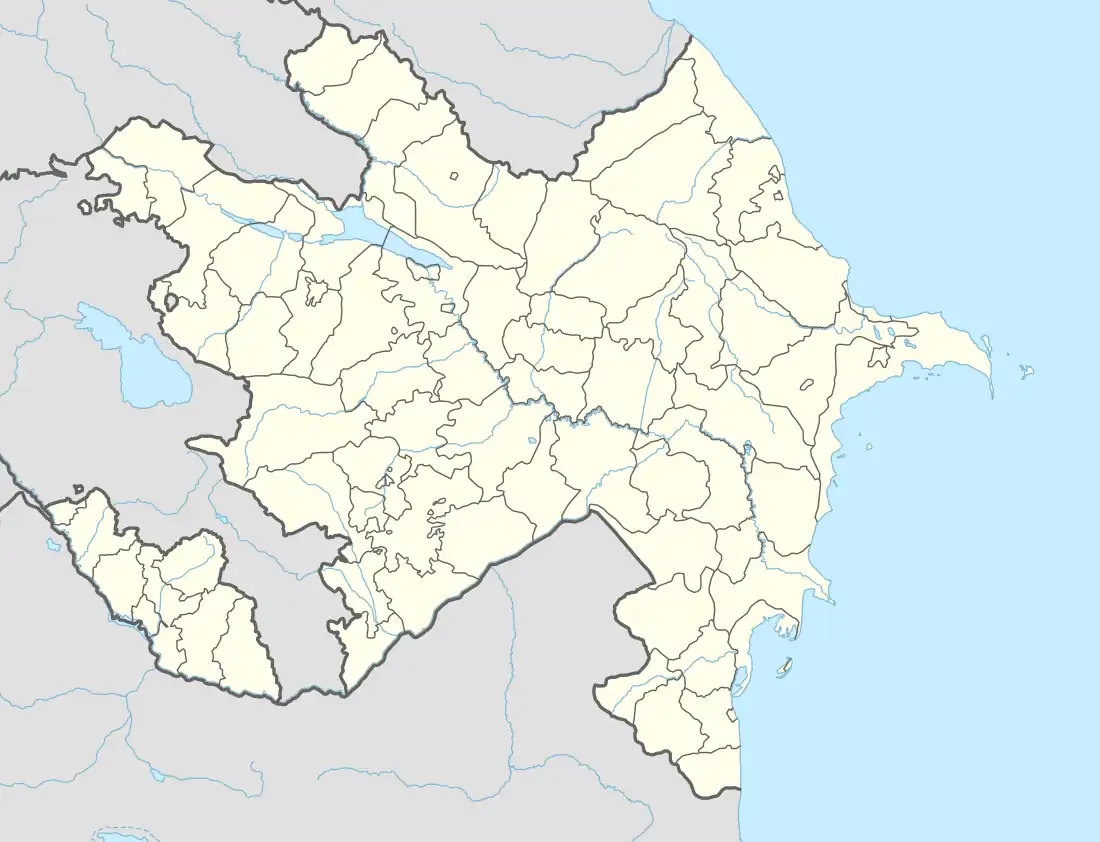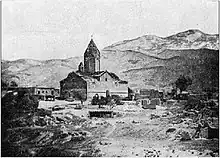Şurud | |
|---|---|
Municipality | |
 Şurud | |
| Coordinates: 39°09′05″N 45°47′42″E / 39.15139°N 45.79500°E | |
| Country | |
| Autonomous republic | Nakhchivan |
| District | Julfa |
| Population (2005) | |
| • Total | 180 |
| Time zone | UTC+4 (AZT) |

St. Hakob-Hayrapet Church
Şurud (anglicized as Shurud), also Shorot (Armenian: Շոռոթ)[1] or Shurut (Armenian: Շուրութ)[2] is a village and municipality in the Julfa District of Nakhchivan, Azerbaijan. It is located 23 km to the north of the district center, on the slope of the Zangezur mountain range.
It has a population of 180, primarily occupied in farming and animal husbandry. There are a secondary school, a club, a library, a communication center, and a medical center in the village.[3]
History
Shurut was a small Armenian-populated town during the late medieval period, with churches, schools, monasteries, scriptoriums, and a population of several tens of thousands. It is first mentioned in historical sources from the 13th century.[4]
Monuments
- St. Hakob-Hayrapet Church was a 12th-century Armenian church located in the center of the village and was destroyed at some point between 1997 and 2006.[5]
- St. Astvatsatsin Monastery or Kusakan Monastery was an Armenian monastery located 1 km north of the village and was razed to ground at some point between 1997 and 2006.[6]
- St. Gr. Lusavorich Monastery was an Armenian monastery located 1.5–2 km northeast of the village and was destroyed at some point between 1997 and 2006.[7]
- St. Stepanos Monastery was a 9-10th century Armenian monastery located near the village and destroyed at some point between 1997 and 2006.[8]
- Main Cemetery of Shurud was an Armenian cemetery consisting of 500-510 tombstones and was located in the northern part of the village.[9] The cemetery was destroyed at some point between 1997 and June 15, 2006.[9]
Notable people
- Naghash Hovnatan (1661–1722), Armenian poet, ashugh, painter, and founder of the Hovnatanian artistic family
See also
References
- ↑ Ayvazyan, Argam. "Նախիջևանի ԻՍՍՀ հայկական հուշարձանները". Retrieved 29 March 2021.
- ↑ "RAA: Publications". RAA Armenia. Retrieved 29 March 2021.
- ↑ ANAS, Azerbaijan National Academy of Sciences (2005). Nakhchivan Encyclopedia. Vol. II. Baku: ANAS. p. 319. ISBN 5-8066-1468-9.
- ↑ Ayvazyan, Argam (1995). Նախիջևան. բնաշխարհիկ պատկերազարդ հանրագիտակ [Nakhijevan: patkerazard bnashkharhik hanragitak]. Yerevan, Armenia: «Հուշարձան» ["Hushardzan"]. p. 121. ISBN 5-8079-0911-9. Retrieved 29 March 2021.
- ↑ Khatchadourian, Lori; Smith, Adam T.; Ghulyan, Husik; Lindsay, Ian (2022). Silent Erasure: A Satellite Investigation of the Destruction of Armenian Heritage in Nakhchivan, Azerbaijan. Cornell Institute of Archaeology and Material Studies: Ithaca, NY. pp. 246–249. Archived (PDF) from the original on 24 September 2022.
- ↑ Khatchadourian, Lori; Smith, Adam T.; Ghulyan, Husik; Lindsay, Ian (2022). Silent Erasure: A Satellite Investigation of the Destruction of Armenian Heritage in Nakhchivan, Azerbaijan. Cornell Institute of Archaeology and Material Studies: Ithaca, NY. pp. 254–257. Archived (PDF) from the original on 24 September 2022.
- ↑ Khatchadourian, Lori; Smith, Adam T.; Ghulyan, Husik; Lindsay, Ian (2022). Silent Erasure: A Satellite Investigation of the Destruction of Armenian Heritage in Nakhchivan, Azerbaijan. Cornell Institute of Archaeology and Material Studies: Ithaca, NY. pp. 260–263. Archived (PDF) from the original on 24 September 2022.
- ↑ Khatchadourian, Lori; Smith, Adam T.; Ghulyan, Husik; Lindsay, Ian (2022). Silent Erasure: A Satellite Investigation of the Destruction of Armenian Heritage in Nakhchivan, Azerbaijan. Cornell Institute of Archaeology and Material Studies: Ithaca, NY. pp. 264–267. Archived (PDF) from the original on 24 September 2022.
- 1 2 Khatchadourian, Lori; Smith, Adam T.; Ghulyan, Husik; Lindsay, Ian (2022). Silent Erasure: A Satellite Investigation of the Destruction of Armenian Heritage in Nakhchivan, Azerbaijan. Cornell Institute of Archaeology and Material Studies: Ithaca, NY. pp. 250–253. Archived (PDF) from the original on 24 September 2022.
External links
This article is issued from Wikipedia. The text is licensed under Creative Commons - Attribution - Sharealike. Additional terms may apply for the media files.
